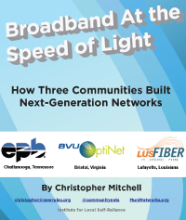Paragould Sets An Example for Another Arkansas Town
Recently, we let you know about the situation in Siloam Springs, Arkansas, population 15,039. The town is now investigating the possibility of building their own fiber network. They have had several community meetings and a "vote of the people" is set for May 22, 2012.
Pamela Hill is investigating the twists and turrns in a series of articles about the vote. In one of her articles, Hill looked into another Arkansas community, Paragould, home of the annual "Loose Caboose" Festival. This community, located in the northeast corner of the state, has successfully operated their own cable network since 1991. Unlike Siloam Springs, the people of Paragould weren't focused first on generating new revenue for the local government, they just wanted to be able to watch tv for a reasonable price.
Back in 1986, Cablevision was the only provider in Paragould. Hill spoke with Rhonda Davis, CFO of Paragould Light, Water & Cable:
"The public wasn’t happy with Cablevision’s service or rates,” Davis said. “We took it to a public vote and did it.”
Prior to Paragould's decision to build their own network, the City had a nonexclusive franchise agreement with Cablevision. The town was dissatisfied by the service they received and, in 1986, Paragould voters approved an ordinance authorizing the Paragould Light and Water to construct and operate a municipal cable system. Three years later, there was a referendum that authorized the city to issue a little over $3 million in municipal bonds to finance the system.
That same month, Cablevision filed suit alleging antitrust violations, breach of contract, and infringement of first and fourteenth amendment rights. The district court dismissed the antitrust and constitutional claims and Cablevision appealed unsuccessfully. The case attracted attention from lawyers and business scholars across the country.


